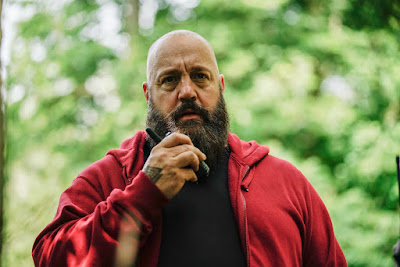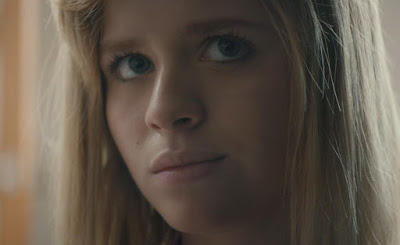Four kids on holiday in Cornwall meet a magical creature on the beach with the power to grant wishes.
One glance at the movie poster for this film and it tells you a lot of what to expect from this flick; something that would easily fall into the same category as The Muppets or Fraggle Rock. Four Kids and It is an adaptation of the 2012 novel, Four Children and It, which in turn is inspired by E. Nesbit's 1902 novel, Five Children and It. Two distinct levels of source material should form a solid foundation for a children's film with a good moral compass.
The screenplay, which is written by Simon Lewis, is not quite up to scratch, however. If you have read the books, you will be aware that the film is a fair departure from the materials that it is sourced from, which could have been a brilliant case of creating a unique version of the story, but instead forms a flat, lifeless film with little in the way of a cohesive structure. The entire premise of the original story is based around the idea of "being careful what you wish for", with the frivolous dreams of children turning into scary scenarios that teach the children about the consequences of their actions.
In this adaptation, on the other hand, the characters have been rewritten to include two broken families meeting for the first time, and as such, the majority of the film focuses not on the wish-granting creature, but on the conflicts between these children and their position on whether to try and "fix" their respective families or move forward with a mixed family. The change in focus from the magical creature to the family conflict means a reduced cost in special effects, but it also means a lot fewer exciting scenes for the kids to enjoy.
The magical creature itself is an interesting choice. The Psammead is a sand fairy that--thanks to the visual styling of Dark Crystal's Brian and Wendy Froud--looks more like a decaying, neglected, E.T. toy covered in moss. Voiced by Michael Caine, the character is the highlight of the film but is such a small part of the story (compared to the familial struggles) that Caine's mature, sophisticated voice is completely wasted on this farting CGI creature.
Russel Brand is also present in the film with a new character and, again, you can't help but feel that the character was written with Brand in mind, purely to sell tickets on the name and face recognition alone. His character is such an over-the-top villain, and while he introduces the only effective moral to the story (which coincidentally coincides with the original story's premise), his presence is also minimal and feels tacked on.
For a film that is meant to be about the dangers of grandiose wishes, there is a surprising lack of consequence to any of the wishes; no injuries, no long-term effects on the plot, a simple "sorry" and these children carry on as if nothing has happened. There is no point when the children are forced to eat humble pie and develop as characters because of it, they simply stay in their lane until everything has to work out after the film.
Each child has a unique perspective on their character concerning the family situation, one that wants to reunite her mum and dad, one that recognises their parents are not in love and wants to move forward, one that wants to run away and live with her father, and one that simply wants everyone to be happy. The tension in the two broken families is reasonably well-considered, allowing each child an opportunity to put forward their perspective.
Four Kids and It attempts to provide some more mature themes to appeal to adult audiences, but the sexually promiscuous nature of the two parents, or Brand throwing about phrases such as "ethnically insensitive erotica", does little to make this a film that will hold wide appeal.
With mediocre computer-generated effects on display, this is a film that will only really appeal to the under-8-year-olds who will be wowed by the concept of being able to fly or have superpowers. Nothing of consequence really seems to happen, and while the story lacks any depth, it will pass some time for the younger ones.
Four Kids and It is in cinemas from September 24, 2020
Originally posted to: https://djin.nz/Kr8711
























